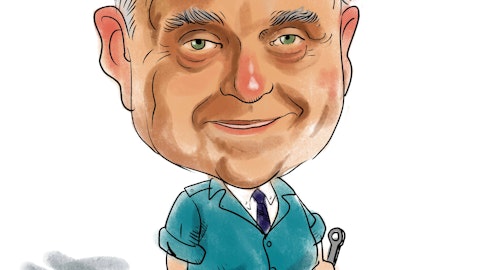I recently discussed how Google Inc (NASDAQ:GOOG) and Wynn Resorts, Limited (NASDAQ:WYNN) excel in employee satisfaction. Today, I wish to discuss a company that at one time was lauded for their treatment of employees, but where today employee morale has deteriorated badly, and along with it, its share price.
When the company’s founders were at the helm, employees were treated very well, and morale was high. You can look through this link “The HP Way,” to see a list of objectives that Hewlett-Packard Company (NYSE:HPQ) set for their corporation.
When you read through you’ll notice that the company placed employees behind profit on its list of priorities. However, the way they conducted business years ago had managers making decisions who were intimate with employee concerns and took them into account, rather than typical bureaucratic decision making that adheres primarily to bottom line. Here’s a quote from founder David Packard illustrating the change towards a more “shareholder-friendly” way boards generally work today.

Both Wynn Resorts, Limited (NASDAQ:WYNN) and Google Inc (NASDAQ:GOOG) have its founders still at the helm of the ship. David Packard was a founder of Hewlett-Packard Company (NYSE:HPQ). To a founder, a company is like a child, and they want every part of it healthy. They view/ viewed employees as the lifeblood of their baby.
When the first recession hit in the 1980’s, instead of laying people off, Hewlett-Packard Company (NYSE:HPQ)had everyone work 80% of the time for a while. Management realized that experience and corporate continuity was important, and that keeping your full staff makes it much easier to get back on your feet when a recession ends.
Compare this today, where management looks for the first opportunity to cut costs and bolster short-term profits.
Hewlett-Packard Company (NYSE:HPQ) was in a high-profit margin business — scientific and test equipment — and its board was studded with technical experts, including Nobel laureate Luis Alvarez, who were able to steer the company wisely during the growth and development of semiconductor technology. This took concentrated scientific effort, had long development cycles, and was capital intensive. Contrast this with the current “technology” development that is on a much faster cycle, requires much smaller amounts of capital investment, and is much more geared towards the development of software.
When Carly Fiorina took over, she pushed the company into a commodity, low profit margin business by merging with PC maker Compaq. The company subsequently spun off its high profit margin business in scientific equipment — on which the company had built its reputation — as Agilent. In terms of new business development, if there was no promise of a $1 billion return in a year or two, Hewlett-Packard Company (NYSE:HPQ) wasn’t interested.
Compare this to Google Inc (NASDAQ:GOOG) and Wynn Resorts, Limited (NASDAQ:WYNN), both high margin businesses, and both willing to put their large amounts of capital to work (Google with massive amounts R&D and putting out fiber networks, and Wynn with multi-billion dollar casino expansions).
The CEO used to be much closer to the rank and file employees. HP had a corporate fleet of jets that would run regular routes from PaloAlto to Colorado to Oregon and back. Hewlett-Packard Company (NYSE:HPQ) CEOs like John Young would take trips together with employees going for whatever reason to these locations, and had direct informal interactions with lower levels.
Steve Wynn Resorts, Limited (NASDAQ:WYNN) interviewed every single employee he hired for the Wynn casino. It was his baby, he wanted everything perfect. Employees got to meet the boss.
At Google Inc (NASDAQ:GOOG) employees all over the world have access to founders Sergei and Larry on a regular basis via video conferences where questions to be asked them are voted up or down by other employees.
Obviously as a company grows, it’s harder to for upper management to really know their employees, but today’s HP culture is a far cry from the past.
About the time Carly Fiorina took over HP, the company started to implement cost-cutting measures en masse. Benefits were cut, salaries stopped rising, employees were laid off.
But when Mark Hurd took over HP, things really started to deteriorate. Hurd cut costs to the bone. Whenever I would ask my friends how things were going, the answers were never positive. “Projects keep being cut that are deemed non-essential,” they’d tell me. “Hurd doesn’t seem to understand that one of those might be the new laser-jet printer. He’s cutting costs just to cut them, it seems.”


